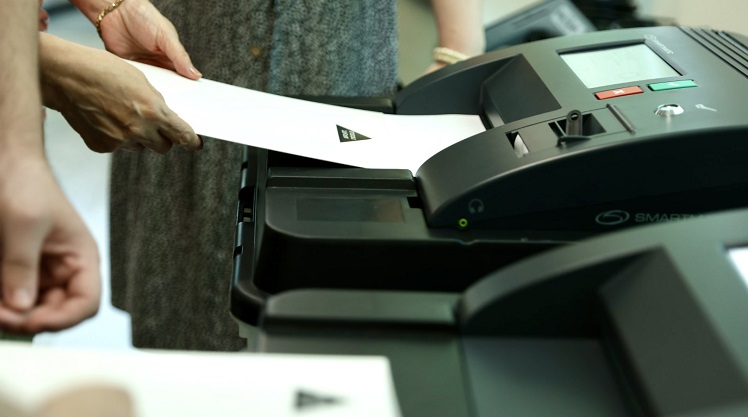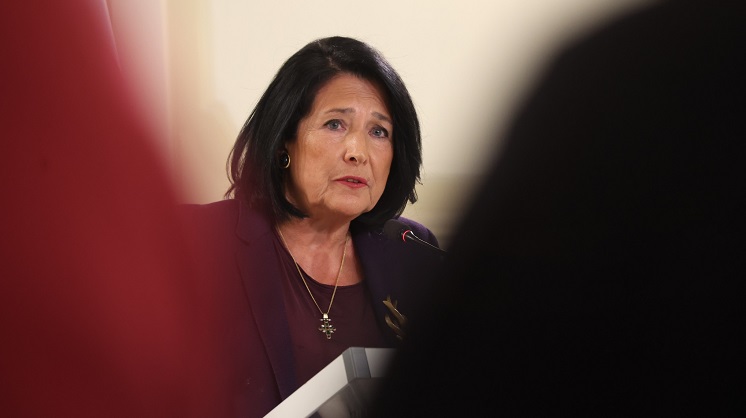Georgians head to polls in "historic" Parliamentary elections

The Georgian Central Election Commission has registered 3,508,294 eligible voters. Photo: CEC press office
Georgian citizens domestically and abroad are voting today in "historic" parliamentary elections that mark the country's first fully proportional vote since it regained independence from the Soviet Union in 1991, and the first vote where approximately 90 percent of ballots will be cast electronically.
Both the ruling Georgian Dream party and opposition forces have termed the election as "decisive" or a "crucial referendum”, albeit for contrasting reasons.
Key information on the elections
For the first time, all 150 seats in Georgia’s unicameral Parliament will be filled under a fully proportional system, with seats awarded based on each party's share of the national vote. Parties must secure at least five percent of the total vote to gain representation.
Nearly 90 percent of voters will cast their ballots electronically, using a new verification system to confirm voter identities. Voters will complete paper ballots, which will be scanned by optical scanners to produce preliminary results. At the close of voting, poll workers will manually count all ballots, with only the results being reflected in the final summary document.

Electronic devices are not connected to the Internet, ensuring no risk of cyber interference. Voting is conducted in secret and all polling stations feature modified 'cut-out' booths. Taking photos or videos inside the booth is prohibited. Photo: CEC press office.
Parties, observers, and media coverage
The election is being observed by more than 23,000 observers of 111 domestic and more than 1,700 observers of 76 international organisations, with more than 2,800 employees of 199 media outlets registered to cover the race. Eighteen political parties and alliances have presented their party lists for the election.
Voter participation and overseas voting
The Georgian Central Election Commission has registered 3,508,294 eligible voters, with 3,113,747 casting their ballots electronically. Among them, 135,922 first-time voters will participate, while 64,238 have requested transfer boxes to vote from their residences.
In total, 95,910 Georgian citizens have been registered with special lists for polling stations abroad.
A total of 3,111 polling stations will serve voters, including 3,044 within Georgia. Thirteen specialised stations have been established, with 12 in penitentiary institutions and one in a mental health facility. Overseas voting is set up across 67 stations in 53 cities within 42 countries.
Electronic voting technologies will be used in 2,263 polling stations across Georgia, while the remaining polling stations, including those abroad, will conduct voting in the traditional manner.
The elections will be managed by over 54,000 election administrators, with more than half appointed by authorised political parties and the remainder serving as independent, professional members. Each commission is composed of 17 members - eight non-partisan members and nine representing political parties. Among the party-appointed members, one represents the ruling party, while the other eight are appointed by various political parties.

Bidzina Ivanishvili, the Honorary Chair and founder of the ruling GD party, leads the party list for the vote. Photo: GD press office.
Major competitors in elections
Key political competitors include:
- Georgian Dream (ruling party)
- Unity – to Save Georgia (led by the United National Movement, in coalition with Strategy Agmashenebeli and other political figures)
- For Georgia (led by former Prime Minister Giorgi Gakharia)
- Coalition for Change (Ahali, Girchi – More Freedom, and Droa)
- Strong Georgia ( Lelo for Georgia, For People, Citizens, and Freedom Square)
Key political messages
The ruling party has framed the election as a "key referendum”, warning the opposition, whom they label as "foreign-influenced agents”, could "drag Georgia into the [Russia-Ukraine] conflict”.
They have also urged voters to help the GD secure a Constitutional majority of at least 113 seats, pledging to prosecute the UNM for alleged crimes committed while in office and for "dragging Georgia into the 2008 Russia-Georgia war”.
The GD has further advocated for bolstering the role of the Orthodox Church, “protecting youth from pseudo-liberal values”, and preparing the country for a “peaceful reintegration” with the Russian-occupied regions of Abkhazia and Tskhinvali (South Ossetia).
Opposition groups, in turn, have accused the ruling party of "aligning with Russian interests" and “diverting” the nation from its Euro-Atlantic path. They point to controversial legislations, including the law on transparency of foreign influence, which was passed amid domestic and international criticism earlier this year, laws on “family values” and “protection of minors”, and further announced plans and bills.
President Salome Zourabichvili in May introduced an action plan, the Georgian Charter, aimed at uniting “pro-Western” opposition. The Charter, now signed by key opposition groups, proposes formation of a temporary government should the opposition win, and pledges to enact reforms to move the country closer to Europe before holding extraordinary elections next year.

President Zourabichvili pledged to nominate the composition of the "temporary government" after the elections. Photo: President press office.
The GD has slammed the plan as "unrealistic" and “foreign-influenced”, contending the actions of the President and the “radical opposition groups” aim to “spark unrest in the country” and “suspend its development”.
Giorgi Kalandarishvili, the CEC Chair, on Friday urged monitoring organisations to “adhere to legal guidelines, avoid interfering in election commission functions, and support a calm and professional election process”.
He highlighted that disinformation and manipulative campaigns, including “unfounded accusations aimed at discrediting the election administration and voting process”, continued to pose “significant challenges”.
The official further pledged “we will inform the public of the first preliminary data within 1-2 hours after the voting concludes”.
Along with general elections, five candidates have been nominated by three electoral entities for Samtredia and Chokhatauri City Assemblies in western Georgia, while eleven electoral entities have been registered for the Supreme Council elections - a legislative body - in the Adjara Autonomous Republic in the country’s west.
 Tweet
Tweet  Share
Share